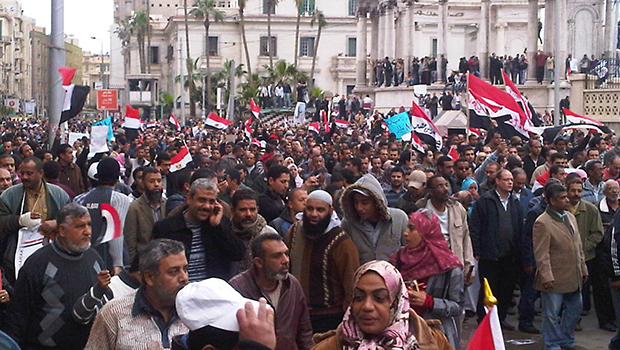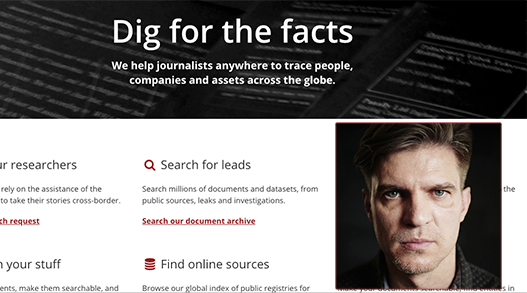Hisham Allam is an award-winning investigative reporter based in Cairo. He was an investigative editor for the El-Watan newspaper, but the recent crackdown on the Egyptian press has taken a toll on his freedom to report the truth. In this Secrets of the Masters interview, he describes his groundbreaking coverage of the Egyptian revolution and explains why he recently quit his job.
We’re all watching the conflict in Egypt with great concern and apprehension. How have recent events affected your work as a reporter?
The situation in Egypt is very complicated, and the Western media sees the scene as a military coup against a democratically elected president who did not complete his presidential term. Meanwhile, the view within Egypt is completely different. The citizens do not care about the process of democracy as much as they care about how it will be implemented.
The president they voted for a year ago had committed numerous errors which created feuds between him and most of the state institutions. Consequently, both state owned and private local media volunteered to defend the new regime against the former.
In such a complicated situation, most of the local media have become unprofessional. They are biased against the ousted president and his supporters. They are deliberately avoiding the publication of any reports or news which condemn the ministries of interior and defense who led the coup.
It has become compulsory that events get covered from one angle, which condemns the ousted president’s supporters and make them appear criminals, while local media ignore completely all the brutal killings and arbitrary arrests committed against the former regime supporters.Most respected journalists have decided to leave their media institutions temporarily for the fear of being exposed to pressure or being obligated to deceive the readers and audiences.
I quit my job as an investigation editor for this reason.
One of your award-winning investigations examined a prison break at the height of the protests against former President Hosni Mubarak, which was suspected to have been orchestrated by the government. What were your findings in this investigation?
The majority of Egyptians believed that the regime of former President Hosni Mubarak masterminded the process of opening the prisons all over Egypt in order to create a state of chaos to abort the revolution. In the meantime, I discovered that one of the prisoners belonging to the Palestinian movement Hamas – the armed wing of the Muslim Brotherhood, which ruled Egypt after the revolution – had arrived to his home in Gaza after only 3 hours after the storming of the prison in Cairo from which he fled. Under normal circumstances it takes at least 6 hours.
I then discovered that another prisoner belonging to the Lebanese Hezbollah reached Beirut in just 3 days after his escape. This confirmed that there were certain arrangements made to open the prisons and use them for reasons that were unknown at the time.
How did you find out the truth? What approach did you use to get the crucial information?
Reaching the truth in this investigation was extremely complicated – I had to communicate with the prisoners who escaped inside and outside Egypt. Also it was necessary to contact the people who attacked the prison and then the smugglers who helped some criminals reach Lebanon and Palestine within a few hours.
I found out finally that Hamas and Hezbollah intervened with armed and trained militias, both Egyptians and of other nationalities, to break into a large number of prisons and release criminal and political prisoners. Among them were the leaders of the Muslim Brotherhood, led by Mohamed Morsi, who later became the first elected president after the revolution.
The main accusation is that the Brotherhood was collaborating with foreign bodies (Hamas and Hezbollah) to break in the prisons during the revolution of January 25.
You’ve been threatened and faced legal actions for your investigative work. What have been the most serious threats to your work and how did you respond to them?
I had been threatened with death by Hezbollah members in 2011. My editor insisted on informing the National Security Agency, which did nothing, but fortunately I’m still alive. Under the regime of Mubarak I was threatened with prosecution by some ministers and high-ranking leaders of the state. I remember that during an investigation I did in 2006, when I was in the final year of university, I got sued by two ministers and chairman of the parliament. After 9 months of investigations, the court acknowledged that I was not guilty.
What is the path that led you to investigative journalism in the first place?
Scarcity of information and the misleading of the public by the state owned media. The first step was during university. A train accident happened and hundreds were burnt to death. The state media downplayed the numbers to dozens, and I decided to make a comparison between the number of victims mentioned by local and foreign media. I was harassed by the state security and threatened with dismissal from the university if I continued.
How has the increasing importance of digital and online media (especially the immediacy factor they emphasize) impacted the quality and practice of investigative journalism?
Digital media played an important role at the prison investigation. Fortunately I got videos on YouTube of several attacks on the prison, which were taken by civilians and proved my hypothesis. But you have to double check and examine the sources.
Talk about your approach to stories. Is there anything unusual about the way you conduct your research or choose your themes?
It is simple – I go after the ambiguous stories which provoke me to try to solve them.
What do you consider some of the most important lessons you have learned over the years?
Don’t follow the mainstream. It is safe to follow, but it takes courage to lead.
What are the key elements that make an investigative story truly “click”? What do they have to have and what should they not be missing?
Timing is very important, as well as documentationand the way you present your discoveries. Answer all the questions and get home safe.
What advice would you give young, emerging, investigative reporters?
Doubt what you hear, analyze and respect the intelligence of your opponents. Last advice; don’t trust anybody.


